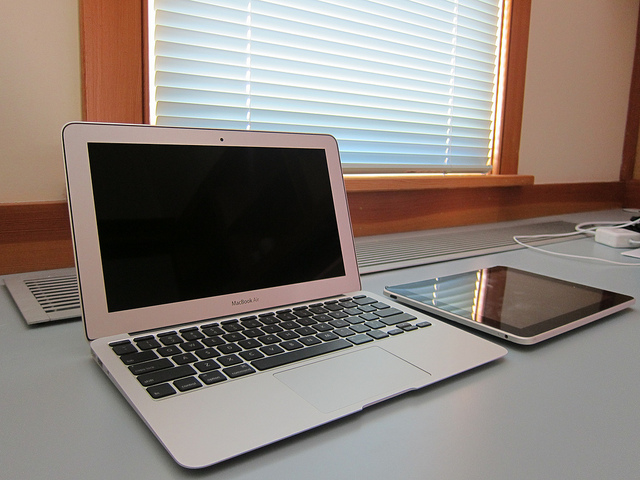
Boston University (BU) is seeking sales bans on a variety of products sold by Apple, Amazon, and Samsung, claiming the companies infringe on a semiconductor patent one of its professors filed for in 1995.
The latest suit, filed against Apple yesterday in US District Court in Massachusetts (PDF), names the iPhone 5, iPad, and MacBook Air as products that Apple should be "permanently enjoin[ed]" from making or selling. BU also seeks financial damages. A nearly identical case was filed against Amazon two months ago (PDF), seeking bans on the Kindle Paperwhite e-reader and the entry-level Kindle Fire tablet. A suit against Samsung filed in March (PDF) accuses that company of infringing BU intellectual property by selling products containing a specific LED part (the products are not named in the complaint). In addition, BU has sued several other companies accused of selling LEDs that allegedly infringe the professor's patent.
The patent at the heart of all these suits is scheduled to expire in January 2015. Filed by Boston University professor Theodore Moustakas, patent #5,686,738 describes "Highly insulating monocrystalline gallium nitride thin films." The patent asserts claims over semiconductor devices that are developed in a particular way and contain silicon, sapphire, gallium arsenide, magnesium oxide, zinc oxide, and silicon carbide. The patent states:
This invention relates to a method of preparing highly insulating GaN single crystal films in a molecular beam epitaxial growth chamber. A single crystal substrate is provided with the appropriate lattice match for the desired crystal structure of GaN. A molecular beam source of Ga and source of activated atomic and ionic nitrogen are provided within the growth chamber. The desired film is deposited by exposing the substrate to Ga and nitrogen sources in a two step growth process using a low temperature nucleation step and a high temperature growth step. The low temperature process is carried out at 100-400.degree. C. and the high temperature process is carried out at 600-900.degree. C. The preferred source of activated nitrogen is an electron cyclotron resonance microwave plasma.
Apple products, BU alleges, "include a gallium nitride thin film semiconductor device claimed by the ’738 patent and thus infringe one or more claims of the ’738 patent."
In the Amazon case, BU says the Kindle Paperwhite and Kindle Fire with a 7-inch LCD screen infringe the patent by including LEDs made by Seoul Semiconductor Company. BU also sued Seoul Semiconductor last year.
BU's patent will have to endure a patent office review. Epistar, one of the companies BU sued, appealed to the US Patent and Trademark Office in May to review the patent. Epistar has submitted potential prior art including a US patent from 1990 and a Japanese patent pre-dating the BU one by a decade.
In the Seoul Semiconductor case, the defendant has proposed a stay of litigation pending the resolution of the patent review. Amazon filed an answer to BU's complaint denying its allegations. Samsung has not yet filed an answer to BU's complaint.
We asked BU's press office if BU or Moustakas ever developed any products based on the patented invention. BU said only that "[t]he complaint speaks for itself and the matter will be resolved through the legal process."
We've asked Apple for a response to the BU lawsuit and have not yet heard back.
BU is far from the first organization to seek bans on Apple hardware. Motorola has sought such bans, as has Samsung and a university in Taiwan, yet iOS devices and Macs are still for sale. Assuming the patent withstands patent office scrutiny and BU can prove Apple and other companies infringe upon it, BU's best-case scenario is probably winning a financial settlement or financial damages.
reader comments
104